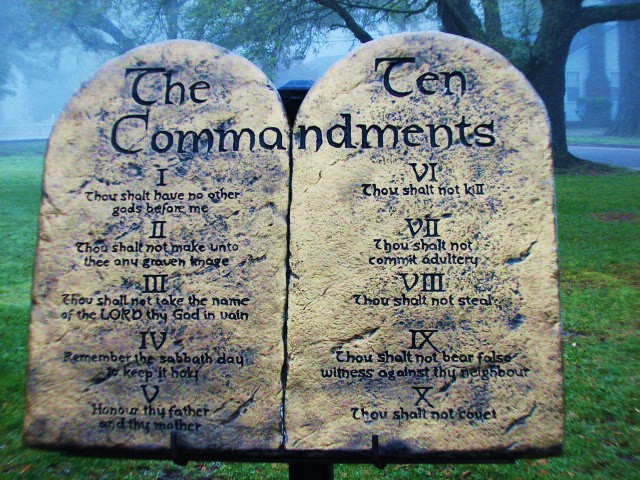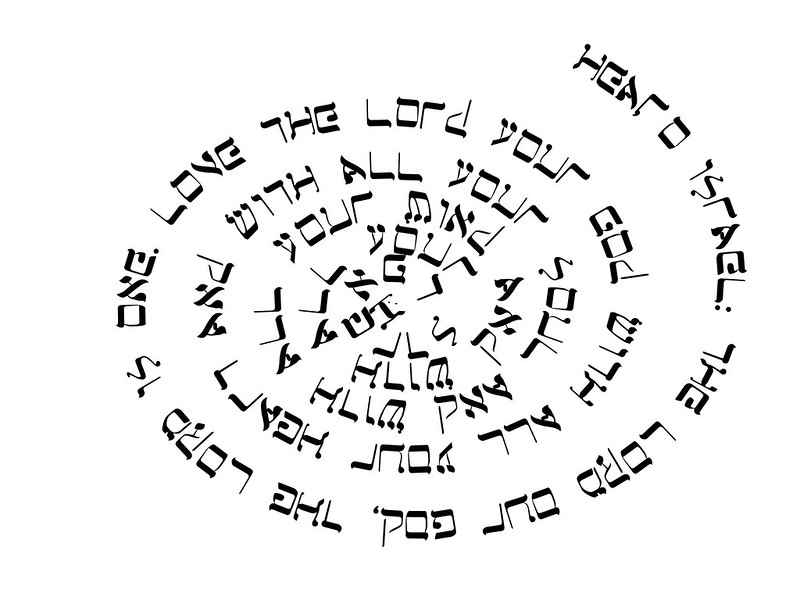Revised Common Lectionary Reflection, Third Sunday in Lent, Year B

March 7, 2021
Lessons: Exodus 20:1-17; Psalm 19; 1 Corinthians 1:18-25; John 2:13-22
Theme: God’s faithful and generous people take seriously the commandments of God and the witness of Jesus.
Key Scripture: You shall not make for yourself an idol, whether in the form of anything that is in heaven above, or that is on the earth beneath, or that in the water under the earth. – Exodus 20:4
Is it possible to preach a cogent sermon on the Ten Commandments? There may be some preachers who can manage it, but considering most confirmation programs spend weeks covering the Decalogue, I’m not so sure it’s a good idea to cram it all 10 into one sermon. Yet this is a foundational teaching for Jesus followers, so avoiding it is an equally bad idea. What’s the thoughtful preacher/teacher to do with this conundrum?
Why not simply begin at the beginning, with the opening statement and first commandment? All the other commandments flow from this key teaching. Jesus compressed the Decalogue (and, in fact, the entire Law of Moses) into just two commands that reflect both meaning and practice: “‘The first is, ‘Hear, O Israel: the Lord our God, the Lord is one; you shall love the Lord your God with all your heart, and with all your soul, and with all your mind, and with all your strength.’ The second is this, ‘You shall love your neighbor as yourself.’ There is no other commandment greater than these’” (Mark 12:29-31).

In Mark’s gospel Jesus combines elements of the Shema and the Decalogue in his answer to a scribe’s challenge. The Shema is that lovely Jewish prayer said morning and night declaring the tenets of faith in the one God and affirming Judaism (see Deuteronomy 6:4 & 7).
This week’s Old Testament lesson provides a perfect Lenten focus on returning to God and following Jesus. By addressing the first six or seven verses of the passage (Exodus 20:1-17), one can set a foundation for deeper study of the remaining commandments, a perfect option for midweek Lenten worship or weekly devotionals. The big picture is, of course, summed up in Jesus’ teaching—love of God and neighbor as self. However, some unpacking about the nature of God and what it means to put God first is needed and timely.
What idols and “gods” do we humans today allow to come before God? Some would cite money, fame, celebrities, sports teams, systemic racism and oppression, or power. Others have lifted up the golden Trump statue that was paraded through the CPAC (Conservative Political Action Conference) annual gathering in Orlando this past weekend. The more pressing concern for any idols and gods is how they prevent us from loving God completely and from loving our neighbors as ourselves. Do our idols and gods replace the truth of the God of Abraham and Isaac, the God that redeemed and continues to redeem God’s people? Do we worship at the altars of power, fame, finance, and personality? Finally, do we even recognize that we’ve allowed other gods and golden calves to come between humankind and the Creator of the Cosmos?

It’s ever so easy to do, you know. By fashioning our own gods and idols we keep things manageable and foster an illusion of control. By ignoring the commandments of God, we are able to fashion gods that suit our own image of how things ought to be, to whom we will pledge our allegiance, and in whom we will cast our hope. We fool ourselves out of fear or anger or dogma and a desire to have things go our way. We resist the God who will not be managed, controlled, or confined by our human will and wiles. This is why we need to be reminded of who God is and what God expects of us.
The Ten Commandments in Exodus are expressed in the singular but are for the benefit of the entire community. They teach us how to live life in community in ways that enable all to flourish and grow. They show us a broader framework for faith and life, one that touches and informs all aspects of who we are and how we live. They illustrate how to love God and neighbor, and yes, even ourselves. Idols and false gods are all around us; returning to the Decalogue reminds us of what really matters and that we love and serve a God who loves and desires the best for all of creation. This is good news that we can use and put into everyday practice. Blessings on your faithful proclamation and teaching for the good of all God’s beloved children.
In Worship
Consider inviting worshipers to reflect on how religion and the marketplace have become strange bedfellows. You might wish to speak this week’s psalm antiphonally, or if you are still worshiping digitally invite congregants to record individual verses of the psalm to be edited together. Either use the video footage of congregants speaking the psalm or add images that reflect the words. Still digital? Consider using this short Psalm 19 video from Manna Media.
You might also like this arrangement of verses from Psalm 19 by Zean Otey:
With
Youth
If you are able to work with your youth group in person, consider using this
week’s Old Testament lesson (particularly Exodus 20:1-7) to discuss idols and
idolatry. You might want to refer to the story of the Golden Calf found in
Exodus 32. Feeling really ambitious? Collect a variety of items and images that
reflect things, people, and places that can become idols. Invite youth to
construct an idol from the assembled items. Talk about how an idol reflects our
own needs and desires and does not let us experience God’s abundant mercy,
love, and grace that flows from right relationship with our Creator.
Writer and ministry professional Jeffrey Curtis Poor offers these four questions to ponder when considering modern day idol worship: 1) Where Do I Spend My Time? 2) Where Do I Spend My Money? 3) Where Do I Get My Joy? 4) What’s Always On My Mind?
With
Children
This week’s focus verse is Exodus 20:4 – You shall
not make for yourself an idol, whether in the form of anything that is in
heaven above, or that is on the earth beneath, or that is in the water under
the earth.
Our Old Testament lesson today is one of two places in scripture where you can find the Ten Commandments that God gave to Israel. First of all, God reminds the people of the covenant relationship they have with their Creator. Next, God gives 10 laws for living. After telling us to have no other gods besides God, we learn a thing or two about idols. What do we learn about them? The short answer is not to have them, to let nothing come between God and us. But just what is an idol today? What gets in the way between God and us? (Invite the children to share and affirm/guide their answers).
Idols don’t have to be fancy statues. They can be people (sports figures, celebrities, politicians), things (cars, homes, sports teams, possessions), or places (yes, even our church buildings can be idols if we’re more interested in the building than in the God whom we worship). Our job is to keep our eyes on Jesus. This will keep us close to God’s heart of love and mercy.
Finish with a simple echo prayer and blessing.
Dear God (Dear God),
Thank you (Thank you) for loving us (for loving us). Help us to avoid idols (Help us to avoid idols) and trust you (and trust you), even when it’s tough to let go of what we want (when it’s tough to let go of what we want). You promise us real life (You promise us real life) and only in you will we find it (and only in you will we find it).
Keep us from fear (Keep us from fear). Keep us hopeful (Keep us hopeful). Make us helpful (Make us helpful). Give us peace (Give us peace). Amen (Amen).
Weekly
Stewardship Bulletin Insert
Keep it simple, steward! Don’t let earthly idols stand
between God and you. Ask yourself this question: Where and how do I spend my
money? We are grateful that you continue to support the ministries of our
congregation during this difficult time with your time, talent, and resources.
Thanks to you, God is glorified.
Stewardship at Home
Take the idolatry challenge this week. The apostle Paul described those who worship idols as having “exchanged the truth of God for a lie, and [having] worshiped and served something created instead of the Creator, who is praised forever” (Romans 1:25). Spend some time with others in your home or circle of friends identifying modern idols. One sure sign of an idol is anything that leaves us desiring more. Idols never truly satisfy; they only enslave us. Ponder and pray how modern day idols might be a challenge to your relationship with God. Read and study this week’s Old Testament lesson from Exodus, as well as the gospel lesson where Jesus cleanses the Temple.
2018 Reflection: https://www.stewardshipoflife.org/2018/03/foolish/
2015 Reflection: https://www.stewardshipoflife.org/2015/03/all-consuming-jesus/
2012 Reflection: https://www.stewardshipoflife.org/2012/03/marketplace-or-holy-space/
Note: Reprint rights granted to congregations and other church organizations for local, nonprofit use. Just include this note: “Copyright (c) 2021, Rev. Sharron Blezard. Used by Permission.” Other uses, please inquire: thewritelife@hotmail.com.



Leave a Reply